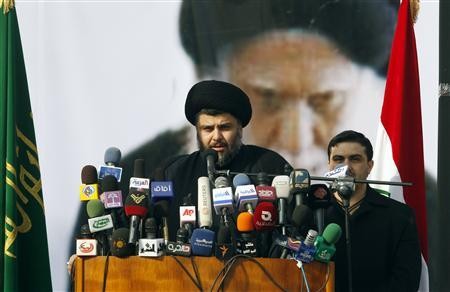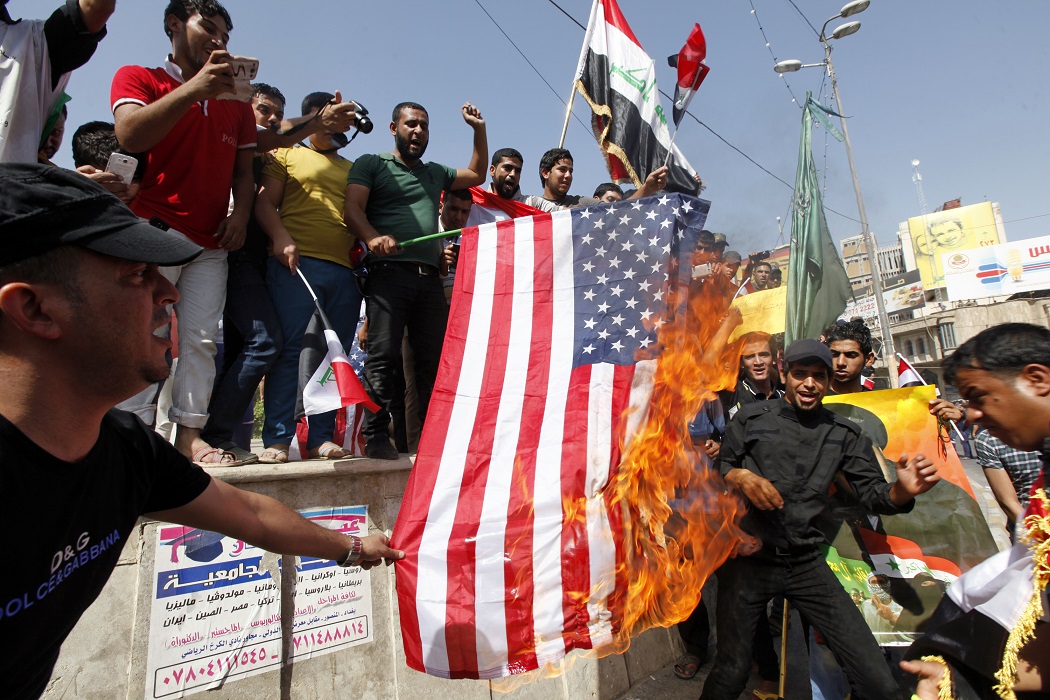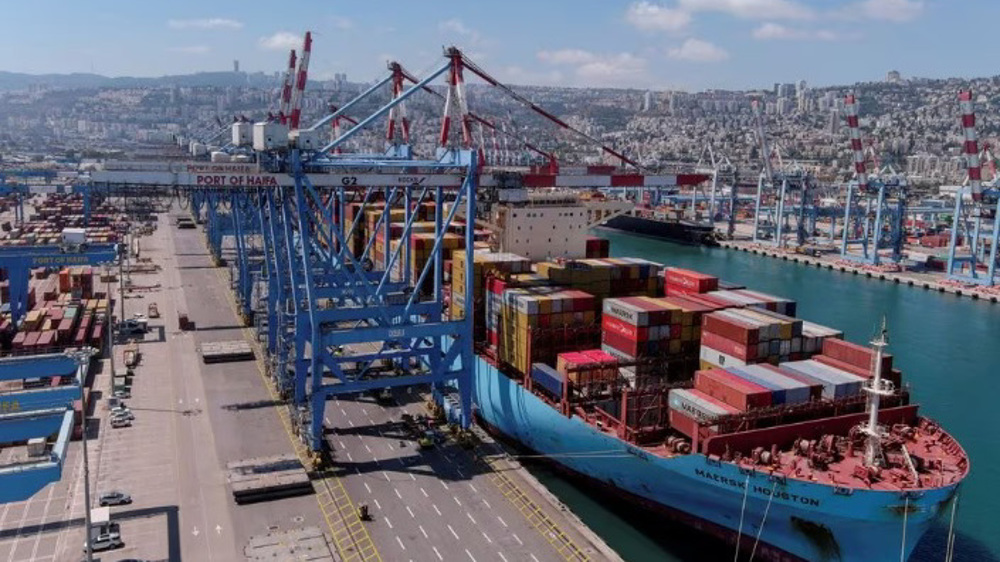Who is Sayyid Muqtada al-Sadr? The Iraqi Shia cleric making a comeback in Baghdad
By Stefano Freyr Castiglione
March 11, 2016 09:51 GMT
Supporters of Shia cleric Muqtada al-Sadr burn a US flag during a protest demanding the government prevent the entry of U.S. troops into Iraq at Al-Tahrir Square in Baghdad, September 20, 2014.REUTERS/Ahmed Saad
Images from last Friday’s demonstrations in Baghdad, where thousands of people gathered outside the so-called Green Zone, may have reminded some observers of the protests that took place in a number of Arab countries in 2011. But during the Arab Spring people were not guided by political leadership, whereas recent demonstrations in Iraq have been promoted and led by one man in particular; Iraqi Shia leader Sayyid Muqtada al-Sadr.
The latter was arrested and executed in 1980, while the former was assassinated in 1999 at the hands of regime agents. Muqtada al-Sadr, a junior and unknown cleric at the time, inherited his father’s legacy and popular support (primarily among working class Shia families in the South and the now ubiquitous Sadr City in Baghdad).
While he opposed the Baathist regime, his rise to prominence came with his resistance to the Anglo-American occupation after 2003, founding a militia known as the Mahdi Army, which was involved in the post-invasion insurgency, and accused of sectarian violence. Being able to count on both large popular support and a powerful military force, he soon became one of Iraq’s leading political and religious figures.
Sadr’s stance with regards to Iraqi politics has been rather ambiguous, leading some to describe him as “a hybrid of anti-establishment positions while being part of the establishment himself.” His involvement in the country’s public life has seen him make moves and take positions which are sometimes in contrast with the Shia ruling majority’s orientations. He is a steadfast opponent of sectarian politics, although some members of his bloc, the Sadrist Movement, have held, and continue to hold, positions in governments based on quota-sharing.
A common thread since 2003 has been the opposition to foreign interference in Iraq, regardless whether it comes from the West (US, UK) or the East (Iran). His disenchantment as to the possibility of pursuing an alternative to sectarian politics was one of the reasons that led him to suddenly announce his withdrawal from political life in 2014, as one of his movement’s officials stated.
Since then, things have evolved in Iraq. The rise of Islamic State (Isis) in which sectarian politics undoubtedly played a role has posed a serious threat to the stability of the country, exacerbated by the political tensions of Maliki’s government at the time. Despite enormous difficulties (the constant threat of extremism, the recent fall of oil prices), his successor Haidar al-Abadi has managed to keep the country afloat as the Hashd al-Shaabi (PMU) and the Security Forces have regained territory from Daesh.
Abadi has been able to ease tensions with the Kurdistan Regional Government (KRG), to take some anti-corruption measures, and to purge the army of inefficient officials. Some issues which have taken root in Iraq have not yet been entirely solved, such as poor public services, corruption, lack of transparency, and sectarianism.
These are the plagues that Sadr has vowed to fight against, on the base of a populist vision of national unity in which religiosity and patriotism are often conflated, as the slogan “Love for one’s country is part of the faith” suggests. The Shia leader supported Abadi’s pledge to carry out a government reshuffle, aimed at installing a technocratic cabinet, as well as to fight corruption, restore services, and implement public accountability.
People in Iraq are getting more and more frustrated at Abadi-led government’s inability to move forward in the reform process — which some elements in the ruling majority actually oppose, seeing it as a threat to their interests. As talks between political factions have not led to concrete results so far, Sadr has seen an opportunity to mobilise the Iraqi masses and push for more audacious measures.
After having a member of his own political bloc, Baha al-A’raji (PM deputy), arrested on corruption and embezzlement charges, he disavowed the corrupt officers in his movement and is currently going to investigate how they have caused corruption.

Looking at the causes that may have led Sadr to such a steadfast return to public life, it has been suggested that he hopes to prevent other Shia groups from asserting their influence in the country, on both a political and a military level. After a government reshuffle was proposed, factions have been in disagreement over how this is to be done: while one side prefers the ministries to be chosen by political parties, another side, led by Sadr, asserts that parties should not interfere.
Sadr has also threatened the current government with a vote of no-confidence if no agreement is reached within 45 days. It is also worth noting that Sadr does not oppose Abadi, but he thinks he should take the chance to promote reforms before it’s too late.
How is Sadr’s comeback to be evaluated? This week, the third demonstration led by the Shia leaexpected to be held, which threatens to storm the Green Zone in the Iraqi capital. There are mixed feelings in the Iraqi street regarding Sadr’s role. Some support his push for change, frustrated at Abadi government’s poor performance in terms of reforms.
Others, however, are afraid that if a breach in security occurs during the protests, it will undermine the rule of law and set a precedent that Sadr is taking the law into his own hands. This is why some of the Green Zone residents have allegedly left the area lest the situation gets out of control.
Despite being characterised by some clearly populist motifs, Sadr’s pledge to fight against corruption and for the sake of the most vulnerable classes of Iraqi society can function as an incentive for the large-scale reforms proposed by Abadi. At the same time, though, Sadr’s uncompromising stances may lead to political stalemate in a country that still needs to recapture the remaining areas under Daesh control.
His call for a more transparent and efficient administration, then, can be beneficial as long as his long-term vision does not hinder the current government’s activity, given the delicate stage the country is going through.
Stefano Freyr Castiglione is an Arab media analyst at Integrity UK






/bnn/media/media_files/c6dcc0791a2954950a3cf724f97495c423c15dc4bb10098e413d9798d7ba616e.jpg)





:quality(70)/cloudfront-eu-central-1.images.arcpublishing.com/thenational/VD4X2HA3J2ZVWKSE6NBPH7AHMA.jpg)